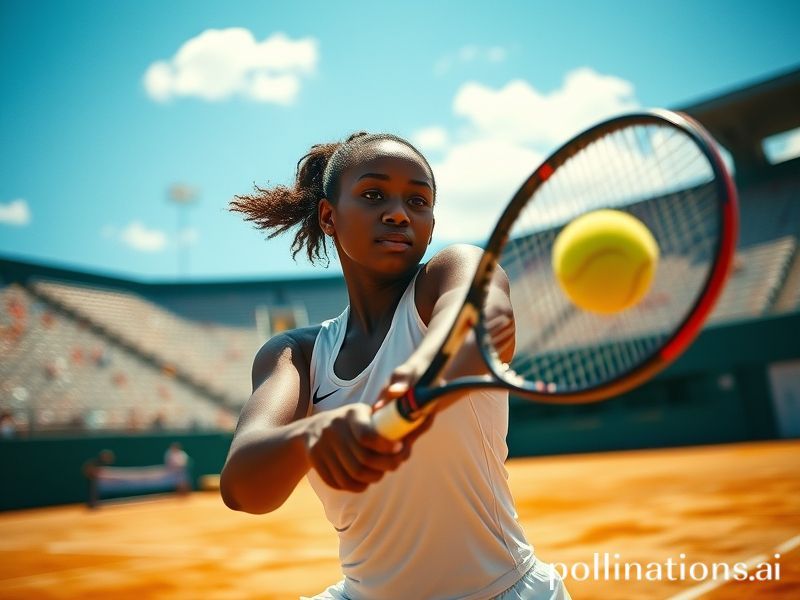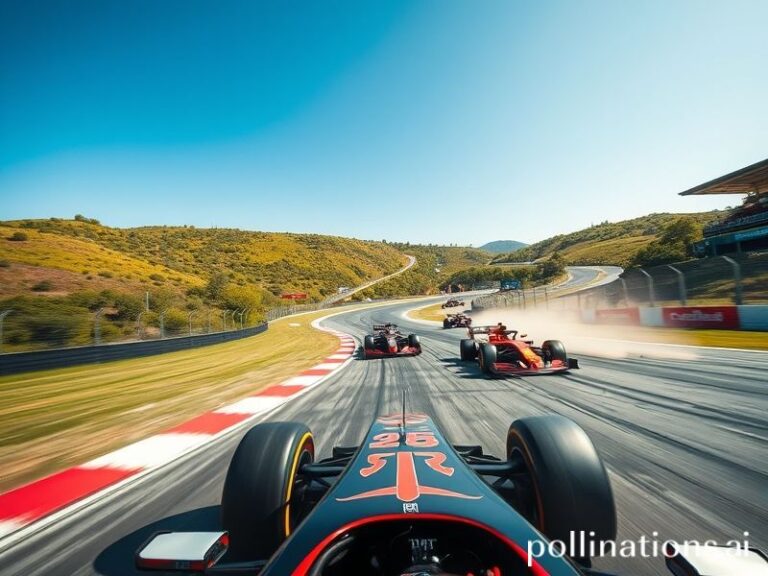Victoria Mboko: The Canadian Teen Serving Geopolitical Spin on the Global Stage
Victoria Mboko’s World Tour: How One Canadian Teenager Is Quietly Redrawing the Map of Soft Power
By Our Jaded Correspondent on the Periphery of Relevance
PARIS—While most 18-year-olds are perfecting the art of ghosting recruiters and pretending to read Sartre, Victoria Mboko has been busy issuing geopolitical IOUs. The Canadian tennis prodigy—currently ranked somewhere between “future headline” and “WTA spell-check suggestion”—has spent the past 18 months hopscotching from junior Grand Slams to ITF $60Ks in locales that diplomats only visit after a coup. If you haven’t heard of her yet, congratulations: you still possess a soul. The rest of us are already calculating the collateral damage of her inevitable endorsement portfolio.
Mboko’s itinerary reads like a NATO travel advisory: Laval, Monastir, Nur-Sultan, Nottingham. Each stop adds another pixel to the blurry JPEG we call “globalization.” In Monastir, Tunisia, she won a title while local commentators debated whether her backhand or the dinar would depreciate faster. In Nur-Sultan (now Astana, because even cities rebrand), she collected ranking points while European energy ministers in the same hotel haggled over pipelines. The symbolism was delicious: one teenager chasing lobs, another chasing LNG; both praying the ceiling holds.
The international press, ever allergic to nuance, has filed her under “Next Gen Maple Leaf,” but that misses the bigger picture. Canada—yes, the polite ice sculpture with oil—has been weaponizing niceness for decades. First came Céline Dion’s vocal cords, then came the Weeknd’s hair, and now here comes a teenager from Brampton wielding a Wilson Blade like a diplomatic passport. Every Mboko victory is a soft-power deposit in a country whose previous military strategy was apologizing to the ocean. If you think that’s hyperbole, note that the Canadian Embassy in Paris live-streamed her junior French Open final on a projector beside a giant inflatable beaver. Somewhere, a Québécois separatist wept into his poutine.
The implications ripple outward. Tennis Australia, still nursing the psychic hangover of the Djokovic deportation saga, has begun courting Mboko with the desperation of a Tinder date who swiped right on GDP growth. IMG’s talent scouts, those well-dressed vultures, have reportedly drafted contingency clauses in case she opts to rep the Rwandan heritage of her father—because nothing says “marketable” like a redemption arc on two continents. Meanwhile, the WTA’s broadcast partners in Asia have already queued up Mandarin-language highlight packages titled “Ice in Her Veins, Poutine in Her Soul.” Subtlety, as ever, died quietly in the server room.
Of course, the machinery of fame is already warming up its conveyor belt of indignities. A cryptocurrency exchange in Dubai has floated the idea of Mboko NFTs—digital collectibles that will be worth slightly less than the electricity used to mint them. Nike’s design team is reportedly sketching sneakers that blend moose antlers with tennis-ball fuzz, presumably to be worn by influencers who think “Brampton” is a type of cheese. And somewhere in Silicon Valley, a 23-year-old product manager is pitching “VictoriaCoin,” a blockchain that rewards users for every forehand winner clipped into a TikTok. The motto: “Decentralize the baseline.” Humanity, it seems, is incapable of meeting a promising athlete without trying to turn her into a Wi-Fi password.
Still, Mboko herself remains charmingly analog. After her latest win in Nottingham, she told the BBC she just wanted “to play good tennis and maybe buy Mom a house with no squirrels in the attic.” The comment was refreshingly free of geopolitical subtext, which is why analysts spent the next 72 hours injecting it back in. One think-tank fellow in Brussels interpreted the squirrel line as a metaphor for NATO’s eastern flank; another claimed it was a coded critique of Canada’s housing crisis. By Friday, a Russian state broadcaster had labeled her a “Western psy-op disguised as a serve-and-volley enthusiast.” Somewhere, the actual squirrels of Brampton are organizing a class-action suit for defamation.
So where does this leave the rest of us, the spectators who can’t even manage continental breakfast without causing an incident? Watching Mboko is a reminder that the world is still capable of minting new myths, even if the minting fee is extracted in dignity and privacy. Her ascent—if it continues—will be narrated by the same commentators who declared Gen Z “too anxious to function” while live-streaming their own panic attacks. And when she finally cracks the Top 50, expect op-eds declaring Canada the new “indispensable nation,” because nothing says indispensable like a polite teenager who can hit a kick serve.
In the end, Victoria Mboko is not saving the world; she’s just hitting fuzzy yellow spheres over a net. But in 2024, that’s practically statecraft. And if she flames out tomorrow, well, the diplomats will find another teenager, the brands will find another face, and the rest of us will keep pretending that progress looks like a Nike swoosh. Until then, raise a glass of overpriced stadium water to the kid from Brampton. May her strings stay crisp, her passport remain unstamped by controversy, and her mother’s attic remain gloriously squirrel-free. History is watching—mostly because the Wi-Fi in the press box is down.







